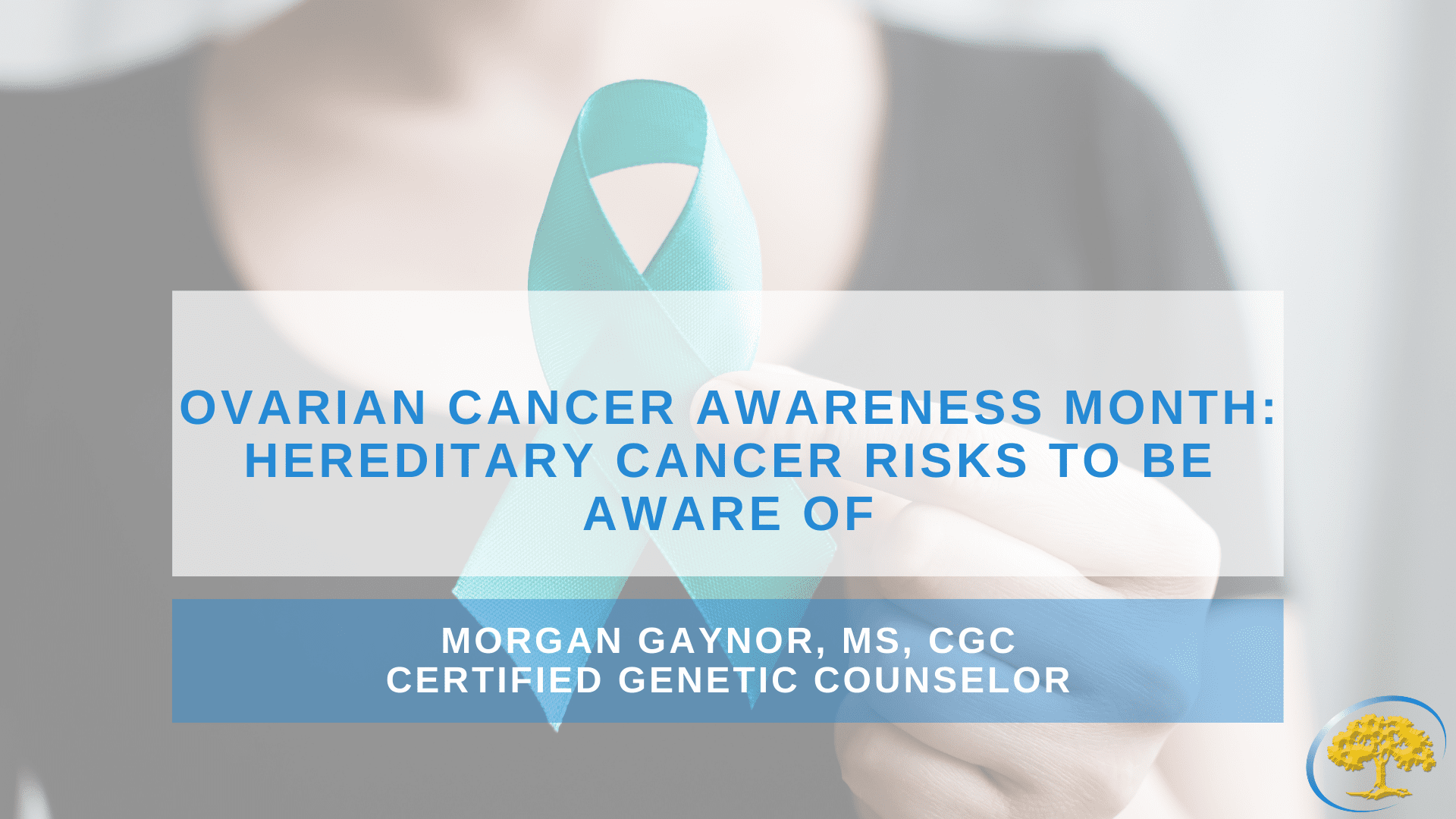
Posted 8 months ago
Ovarian Cancer Awareness Month: Hereditary Cancer Risks to be Aware Of
September is Ovarian Cancer Awareness Month. This month provides an opportunity to raise awareness about hereditary factors that may increase someone’s risk of ovarian cancer. Many cases of ovarian cancer are linked to inherited gene mutations, meaning that these risks can be passed down through families. Around 20% of ovarian cancers are related to inherited gene mutations, making it important to know if these risks run in your own family.
Gene mutations such as BRCA1, BRCA2, and those linked to Lynch syndrome can significantly increase the likelihood of developing ovarian cancer and other cancers as well. Each mutation carries its own set of risks, and screening and preventive measures will vary based on which mutation is involved.
The BRCA1 and BRCA2 gene mutations are among the most common hereditary risks for ovarian cancer. People with these mutations have a much higher chance of developing ovarian and breast cancer, as well as pancreatic cancer, prostate cancer, and melanoma. For example, women with a BRCA1 mutation may have up to a 65% lifetime risk of ovarian cancer, compared to a 1-2% risk in the general population.
Lynch syndrome (Hereditary Non-Polyposis Colorectal Cancer) is another hereditary cancer syndrome associated with an increased risk for ovarian cancer. This syndrome can be caused by mutations in several different genes, including MLH1, MSH2, MSH6, PMS2, and EPCAM. These mutations can increase the risk for several other cancers, including colon, uterine, stomach, small intestine, and other types.
Other genes, like RAD51C, RAD51D, BRIP1, and PALB2 also increase the risk of ovarian cancer. Mutations in RAD51C/D increase ovarian cancer risk by approximately 5-13% and are also associated with a moderately increased risk for breast cancer. Mutations in BRIP1 are currently associated with a 6-13% lifetime risk of ovarian cancer, while mutations in PALB2 carry a 3-5% lifetime risk of ovarian cancer. Because of the difference in all of these lifetime risks, screening and management recommendations will vary based on each individual mutation.
For women with these mutations, regular pelvic exams, transvaginal ultrasounds, and CA-125 blood tests may be recommended. Depending on the mutation, it may also be recommended to consider a preventive surgery to remove their ovaries and fallopian tubes as this surgery can drastically reduce the risk of ovarian cancer. It’s important to emphasize that each mutation has its own list of appropriate screening and treatment recommendations. Therefore, it is important to speak to your healthcare provider about these specific mutation recommendations before pursuing different management strategies.
Those with a personal and/or family history of the findings above may benefit from genetic testing. Children, siblings, and parents of individuals with these mutations have a 50% chance of having the same mutation. If you have already had cancer, knowing whether you carry a gene mutation can also influence your treatment and determine your individualized screening and prevention plan for other cancers. It can also help protect your relatives. If you test positive for a mutation, your family members can undergo genetic testing to allow them to take preventive measures and lower their cancer risk as well. If you have questions about ovarian cancer or other hereditary cancer predisposition syndromes, please speak to your Ironwood provider about a referral to Ironwood’s Genetic Services department.
Morgan Gaynor, MS, CGC
Certified Genetic Counselor
Morgan Gaynor Joined Ironwood Cancer & Research Centers In May 2022. She Earned Her B.S. In Molecular Biology And Genetics From Regis University And Earned Her M.S. In Genetic Counseling From The University Of Arizona.
During Her Time At The University Of Arizona, Morgan Completed A Two-Year Graduate Program And A Thesis On Best Practices In Counseling Low-Level Pathogenicity Results In Cancer Genetics Settings. She Completed Clinical Rotations At Prominent Healthcare Systems Such As Banner, Mayo Clinic, Color Genomics, Phoenix Children’s Hospital, And Dignity Health. During Her Time At These Institutions, She Gained Experience In Prenatal, Cancer, Cardiology, Pediatrics, And Pharmacogenomics Counseling.
Morgan Enjoys Running, Swimming, Cycling, Playing Piano, Hiking, And Spending Time With Her Family.
Please ask your Ironwood Cancer & Research Centers doctor for a referral to see our genetic counselor.

